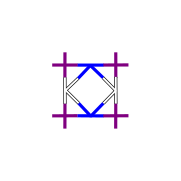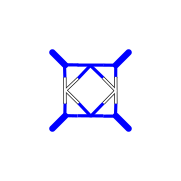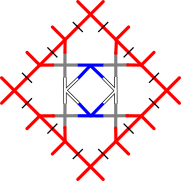Marian’s grounds
Contents
© M. Tempels
Introduction
On this page some of my own designs and finds. Most grounds I found before I learned of Groundforge. Of course, some of them might also have been created by others.
For most grounds I only use names for the units with an addition to indicate the placing of the units in the ground. E.g. in plaits, in a diamond, traditional, … Some units are used in more than one example, with different placings, so naturally those names show up more than once.
The colour grey in the working diagrams indicates cross only.
Fusion
The traditional units separated with plaits. Please note: the plaits should stay plaits. The snowflake-unit example is meant to be made with pins at the sides of the snowflake-unit. The ground came into being as a half stitch spider, but forgetting the twists at the corners.
Sunny stitch
 This stitch I created because I wished to see a little loop at the sides of the rose ground. To obtain this, I used a very onorthodox stitch at the sides of the unit. The examples below use all the same unit, but these units are connected in different ways. The colour white means: crcllcrc on the left and clcrrclc on the right side of the unit.
This stitch I created because I wished to see a little loop at the sides of the rose ground. To obtain this, I used a very onorthodox stitch at the sides of the unit. The examples below use all the same unit, but these units are connected in different ways. The colour white means: crcllcrc on the left and clcrrclc on the right side of the unit.
Ants
 Ants came to life as a variation of the Slavic ground. The result looks like ants.
Ants came to life as a variation of the Slavic ground. The result looks like ants.
In the ground shown on the picture the threads between the bottom and top position of two units are crossed four times. Please note that there are no twists between the cross only and whole stitch at the pins. For more ants, see page Rose grounds.
The star looks like a three paired join, but has crossings instead of twists. For the real star see page Miscellaneous.
Another fish

Bias and Paris ground









